Language learning has undergone a revolution with apps like Duolingo and Babbel making it more accessible. Taking a more traditional language immersion program continues to have its appeal though. I recently set out to answer my own questions about how to best approach language learning. After a full year of daily Duolingo work and a week in a vacation language immersion program, here’s my take on how these two vastly different approaches compare.
This post may contain affiliate links. If you make a purchase through these links, we will earn a small commission at no additional cost to you. We recommend products we have personally used or verified. Read the full disclosure here.
If you don’t have time to read this now, pin it for later!
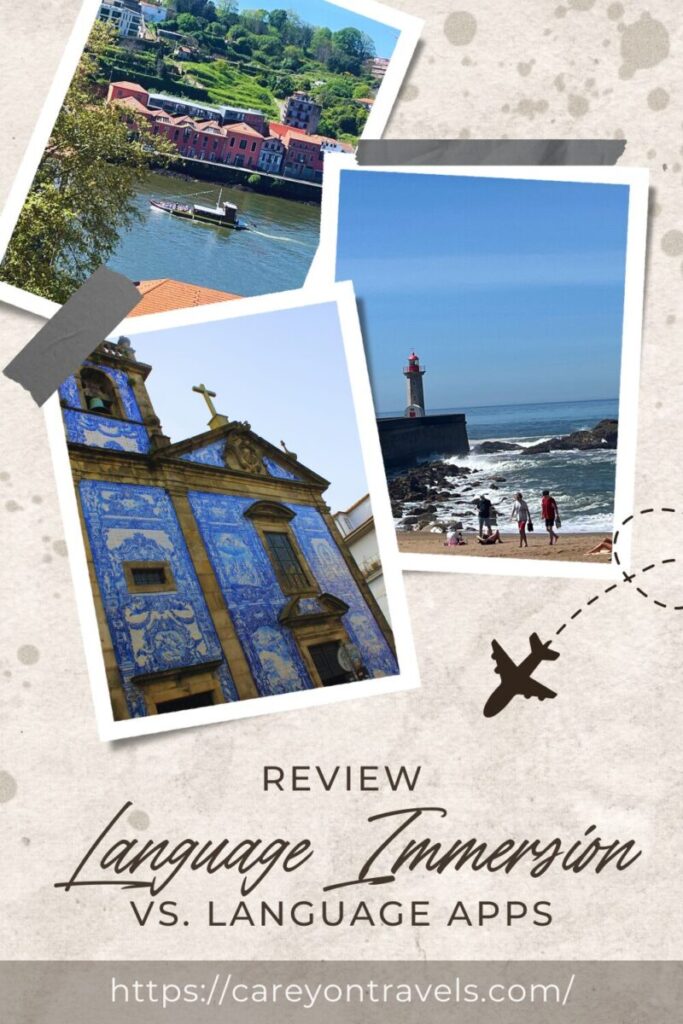
A Bit of Background…
In all fairness, I didn’t undertake this effort just to see which language learning approach is more effective. I’ve spent extensive time in Portugal, though never made enough of an effort to learn Portuguese. Before starting this concerted language learning effort, I could order food in restaurants and could recognize some words, but that’s about it. Given that we are spending more and more time in Portugal each year, I want to be able to communicate well in Portuguese.
1 Year of Language Learning Online
A few people I knew had used Duolingo and recommended it, so I decided to give it a try. Duolingo only offers Brazilian Portuguese, which is not ideal, but I figured it could give me a jump start, which I’d fine tune later. I completed 1 full year of at least one lesson per day, though most days I did more. This equates to 10-30 minutes per day. I spent an estimated 100-150 total hours in that year (sounds like a lot in hindsight). I did enough work consistently to reach the Diamond League of top performers. Just before my 1 year anniversary, I finished the Duolingo Portuguese program, and now have been continuing with their daily refresh lessons. Though I was feeling somewhat confident in my vocabulary, I still didn’t feel like I could hold a conversation.
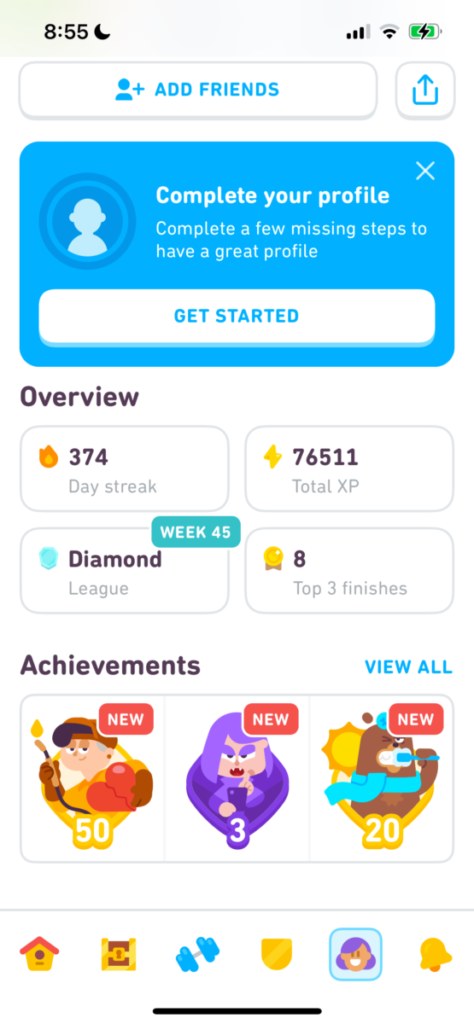
1 Week of Vacation Language Immersion Class
I enrolled in a language vacation immersion class in Porto, where we spent 4 hours/day for one week. That left me with afternoons free to explore some wonderful beaches near Porto. After nearly a year of Duolingo, I took a placement test for the class, and was placed into the A1 class. That meant I was effectively a total beginner! I did recognize and understand most of the vocabulary on the test, but I was lacking the grammar knowledge needed to move to the A2 class.
If you are looking for a great vacation language immersion program in Portugal, check out Oficina de Português in Porto. I have no affiliation with this program. I simply enjoyed the program I attended.

Language Immersion Program vs Language Learning Online
Here’s what I got out of my 1 year of Language Learning Online vs 1 week of the Vacation Language Immersion Program.
| Category | 1 Year Language Learning Online | 1 Week Vacation Language Immersion Program |
|---|---|---|
| Greetings, Introductions, Pleasantries | Basic words and phrases for hello, goodbye, please and thank you, and some pleasantries | More extensive introductions and pleasantries. This included interactive Q&A about where I come from, where I live, what I do, what my hobbies are, my job, languages I speak, my family |
| Vocabulary | Duolingo provided a good amount of vocabulary knowledge, with strong reinforcement. There were a smattering of words that I had to re-learn for Portugal | I learned fewer vocabulary words than I learned in the year of Duolingo, though I also learned some new words |
| Days of the week, months and seasons | Fully covered | Fully covered |
| Nationalities | Fewer nationalities covered | Extensively covered |
| Numbers and letters | Numbers through one hundred, one thousand, one million Pronunciation of the letters was not covered | Numbers through 8000+, one million. Learned construction of complex numbers. Pronunciation of alphabet letters was covered |
| Verb conjugation | Duolingo doesn’t teach verb conjugation per se. Despite this, I was exposed to many present, past, future, and even conditional verbs. I pieced together some verb conjugations | Verb conjugation was a heavy focus. We learned present tense of regular and irregular verbs and a bit of future tense |
| Grammar rules | Duolingo doesn’t teach grammar rules per se. I figured out some of the grammar rules based on what I was reading or writing, but didn’t fully understand the why’s behind many of these | Grammar was a core focus. Articles were covered, including explanation on rules (e.g., when to use “ser” vs “estar”) |
Consistency vs. Intensity
Language Learning Online: One of the biggest advantages of Duolingo is the ability to practice daily. A year of consistent, bite-sized lessons can build a strong foundation in vocabulary without overwhelming the learner. The gamified approach keeps motivation high, perfect for casual learners and those with busy schedules.
Language Immersion Program: On the other hand, immersion classes are intense. Being surrounded by the language and culture for a week forces you to use what you know in real-time situations. This can dramatically improve your conversational skills and help you overcome the fear of speaking. 2-4 weeks of a language immersion program would be much better than 1 week.
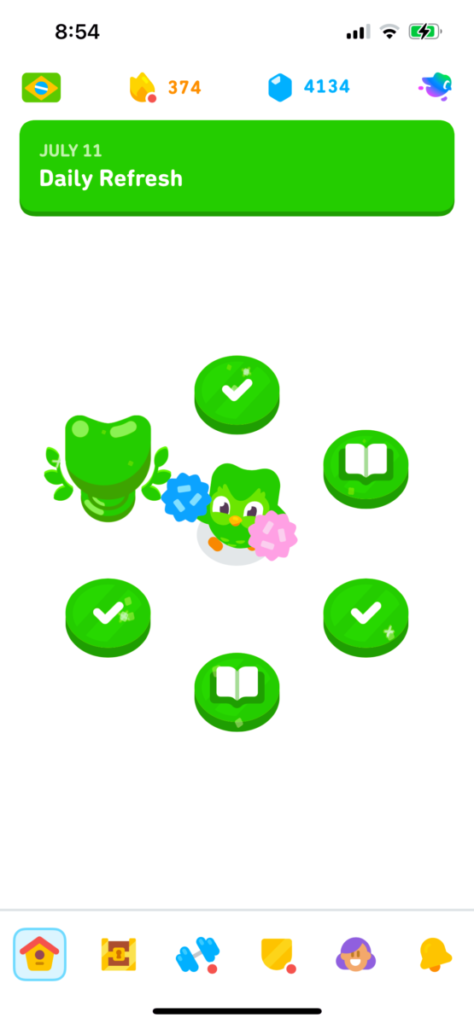
Depth of Learning
Language Learning Online: While Duolingo continuously updates its courses to keep them engaging, it sometimes lacks depth. The focus is more on translation rather than on creating your own sentences, which can be a limitation if you’re looking to become fluent.
Language Immersion Program: Immersion classes excel in providing a deep dive into the language. You learn not just the language but also cultural nuances, which are often missed in app-based learning. This method helps in understanding context and idiomatic expressions, crucial for achieving fluency.

Cost and Accessibility
Language Learning Online: It’s hard to beat free or the premium (Super Duolingo) version at a relatively low cost (currently under US$100 per year). Duolingo is accessible on your phone or computer, allowing you to learn anywhere, anytime.
Language Immersion Program: Typically more expensive, immersion classes can also include travel costs if they are held in a location where the language is natively spoken. However, these costs come with the benefit of direct interaction with teachers and peers, which is invaluable for real-time feedback. After class, you can continue to immerse yourself, using what you’ve learned in social settings. Consider using these 5 Easy Steps to Calculating Your Trip Budget.
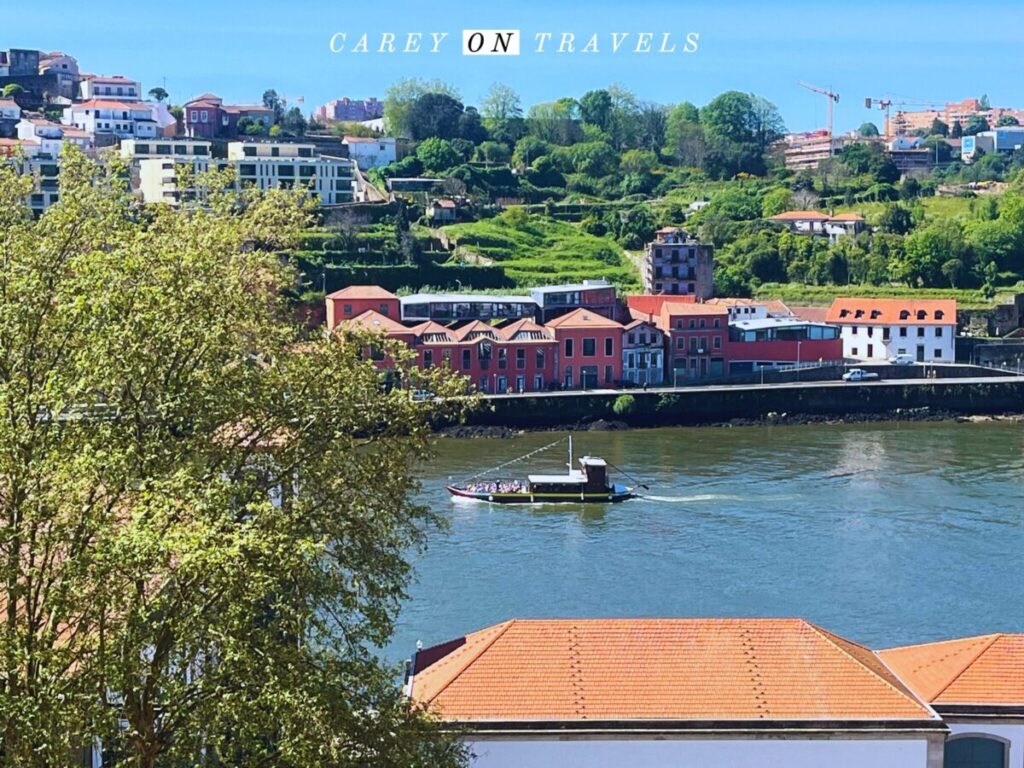
Suitability
Duolingo: Ideal for beginners or those looking to refresh their skills. It’s also great for learners who prefer a self-paced approach without the pressure of real-time conversation.
Immersion Class: Best suited for learners who have a basic understanding of the language and are looking to achieve true fluency. It’s particularly beneficial for those who thrive in structured environments and need that extra push to speak.

Results
Choosing between Language Learning Online and a Vacation Language Immersion Program depends largely on your goals, lifestyle, and how you learn best. If you’re aiming for basic understanding or casual learning, an online program like Duolingo is an excellent start. But if you really want to become fluent and be able to effectively communicate, sign up for a language immersion program. Don’t forget to leave time for exploring the area before or after your class (or on weekends). I enjoyed some amazing day trips from Porto the week before this class.
In the end, combining both methods might just be the best way to learn a new language. At least it was in my case. Since returning home from my language immersion program, I signed up for weekly individual classes with a Portuguese teacher to continue my learning. I still have quite a long way to go, but feel that I am on the right path. I am still doing my language learning online, though I am just doing some refresher exercises each day.
If you liked this post, pin it for later!
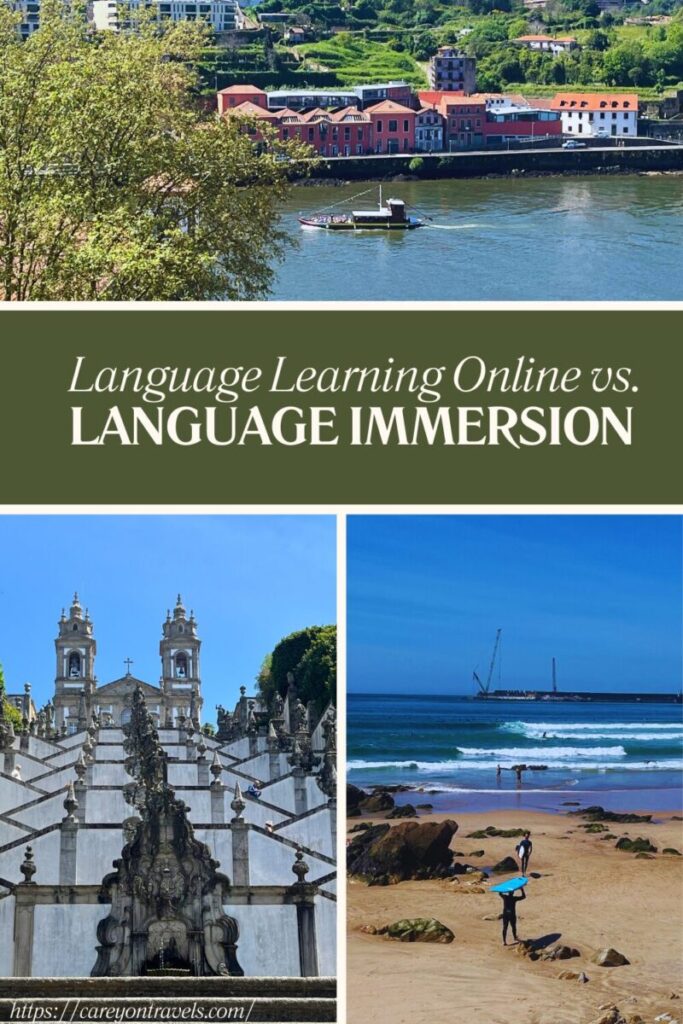
Travel Resources
We recommend booking through our preferred travel booking sites below.
| Air Travel | SkyScanner |
| Lodging | Booking.com, VRBO.com, Expedia.com, Hostelworld |
| Tours and Activities | Viator.com, GetYourGuide.com, TakeWalks.com |
| Car rentals | Discovercars.com |
| Travel insurance | Squaremouth |
| Bike and scooter rentals | BikeBookings.com |
| Train tickets | Trainline, RailEurope |
| Bus tickets | Flixbus, Busbud |
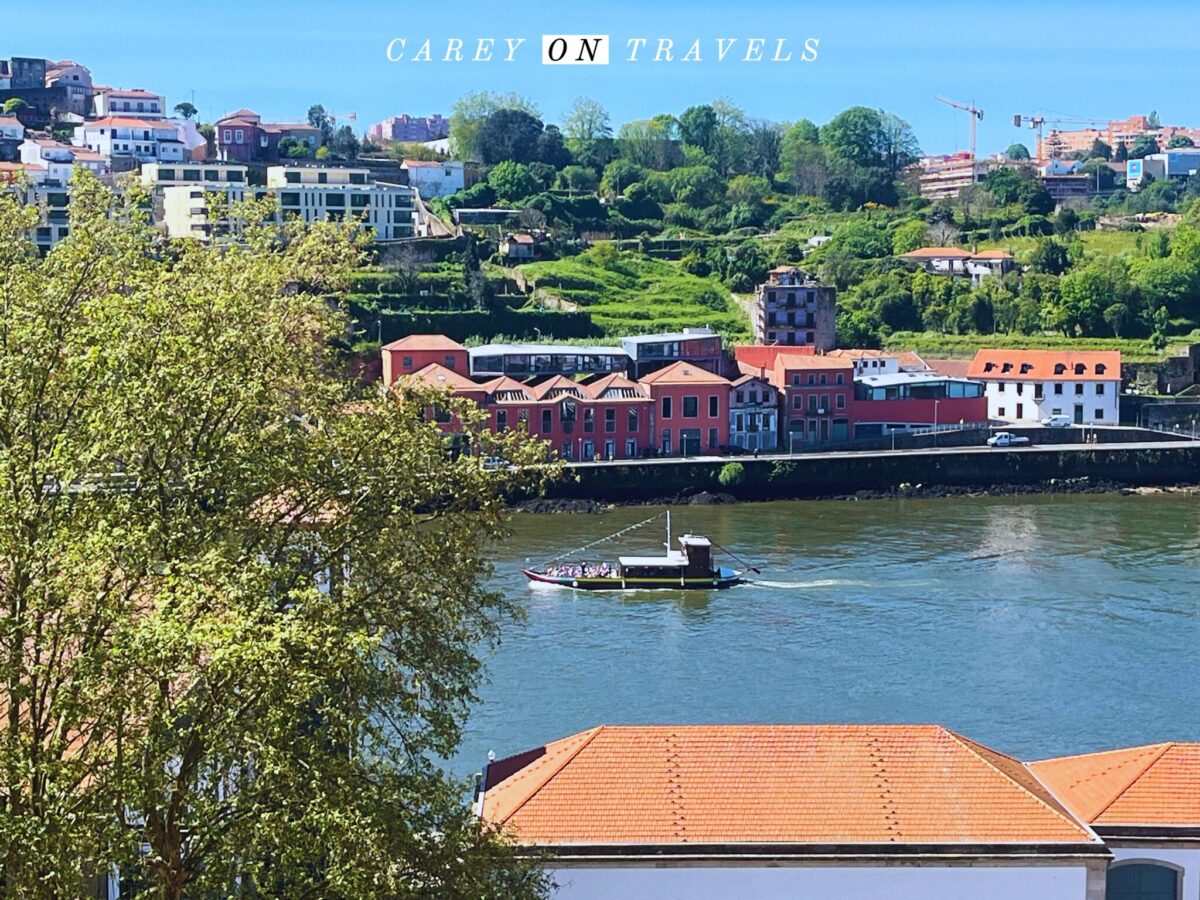



[…] Bolhão Station. This happened to be just around the corner from the language school where I took a language immersion course, so it was the perfect spot to explore during breaks. It is also a great spot to explore during a […]
I’ve been learning Japanese on Duolingo on and off for a year, usually on my commute or before work. It’s pretty great for a free app. I learned some basic conversation and don’t walk around Japan like an eejit understanding nothing. A class would cost a ton more, and while I thought about it, going to Japan costs money, so I’d spend my precious holiday time sightseeing. I am singing up with a regional school next, doing online learning so I don’t have to commute an hour to school, and I am curious how that will work, as I am not a big fan of online seminars but its convenient and cheap.
I’d be interested in your thoughts after you take your online class. I am doing remote learning now too with a Portuguese instructor, making progress.
I’m determined to learn Spanish, Thanks for the info!
Very interesting article. I am learning Indonesian with Duolingo. I think it is a great platform.
Glad you’re enjoying using Duolingo.
I love the idea of a language immersion program! I’ve also been using Duolingo for the last 18 months to learn Spanish. I’ve come on a long way, particularly with reading, but I could definitely benefit from the more immersive experience when it comes to conversations. Thanks for sharing this comparison.
I’d thought about doing an immersion program for a while. I wish I had done 2-3 weeks, but 1 week was definitely helpful.
I like your take on this. Immersion programs sound fun. I did French for 4 years in high school and have considered an immersion program to get my language skills back. I think I will now.
Such a great idea! Thank you for the insight.
Thanks for the feedback!
Very interesting article! I’m a big Duolingo fan and try to learn at least the basics of another language before almost every trip where I don’t speak the language. But, I agree, it is difficult to get much depth and the ability to have longer conversations. I’ve always wanted to do an immersion program, but haven’t yet. So, I loved reading about your experiences. The closest I’ve gotten is hiring an online tutor and supplementing with films, online classes, and videos. Those have been great, but one day I hope to do immersion programs like you. Thanks for the inspiration!
I’ve found that working with an online teacher has been very helpful too. I enjoyed doing the immersion first to make more forward progress though.
What a great idea! Seems quite manageable and sounds like fun 🙂
Thanks!
This is fascinating! I’d love to do the immersion class someday. In the meantime, I’m trying to refresh high school French and German with online apps.
The apps are helpful, especially if you are just refreshing what you learned before.
I think the dual approach is best. I took a one week immersion course in France when my daughter was young. It was a family program. I found it very hard.
I agree, the dual approach works well!
I love this post. This is a question I have wondered about. Thanks for sharing your experience. I am saving for future consideration.
Thanks for the feedback!